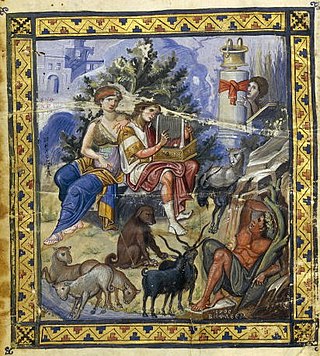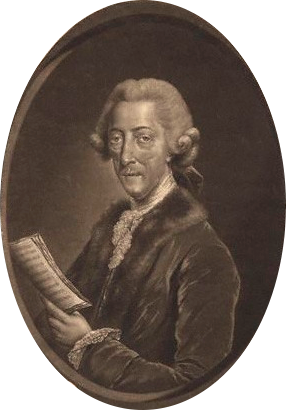
The Hebrew term Abaddon, and its Greek equivalent Apollyon appear in the Bible as both a place of destruction and an angel of the abyss. In the Hebrew Bible, abaddon is used with reference to a bottomless pit, often appearing alongside the place Sheol, meaning the resting place of dead peoples.

The Book of Lamentations is a collection of poetic laments for the destruction of Jerusalem in 586 BCE. In the Hebrew Bible it appears in the Ketuvim ("Writings") as one of the Five Megillot alongside the Song of Songs, Book of Ruth, Ecclesiastes and the Book of Esther although there is no set order. In the Christian Old Testament it follows the Book of Jeremiah, as the prophet Jeremiah is its traditional author.

Ecclesiastes is one of the Ketuvim ("Writings") of the Hebrew Bible and part of the Wisdom literature of the Christian Old Testament. The title commonly used in English is a Latin transliteration of the Greek translation of the Hebrew word קֹהֶלֶת. An unnamed author introduces "The words of Kohelet, son of David, king in Jerusalem" (1:1) and does not use his own voice again until the final verses (12:9–14), where he gives his own thoughts and summarises the statements of Kohelet; the main body of the text is ascribed to Kohelet himself.

A nursery rhyme is a traditional poem or song for children in Britain and many other countries, but usage of the term dates only from the late 18th/early 19th century. The term Mother Goose rhymes is interchangeable with nursery rhymes.

The Book of Psalms, also known as the Psalms, or the Psalter, is the first book of the third section of the Hebrew Bible called Ketuvim ("Writings"), and a book of the Old Testament.
"Twinkle, Twinkle, Little Star" is an English lullaby. The lyrics are from an early-19th-century English poem written by Jane Taylor, "The Star". The poem, which is in couplet form, was first published in 1806 in Rhymes for the Nursery, a collection of poems by Taylor and her sister Ann. It is now sung to the tune of the French melody "Ah! vous dirai-je, maman", which was first published in 1761 and later arranged by several composers, including Mozart with Twelve Variations on "Ah vous dirai-je, Maman". The English lyrics have five stanzas, although only the first is widely known. The song is in the public domain.

Thomas Augustine Arne was an English composer. He is best known for his patriotic song "Rule, Britannia!" and the song "A-Hunting We Will Go", the latter composed for a 1777 production of The Beggar's Opera, which has since become popular as a folk song and a nursery rhyme. Arne was a leading British theatre composer of the 18th century, working at the West End's Drury Lane and Covent Garden. He wrote many operatic entertainments for the London theatres and pleasure gardens, as well as concertos, sinfonias, and sonatas.
The Minor Prophets or Twelve Prophets, occasionally Book of the Twelve, is a collection of prophetic books, written between about the 8th and 4th centuries BCE, which are in both the Jewish Tanakh and Christian Old Testament.
The Ketuvim is the third and final section of the Tanakh, after Torah ("instruction") and Nevi'im ("prophets"). In English translations of the Hebrew Bible, this section is usually titled "Writings" or "Hagiographa".
The oldest surviving Hebrew Bible manuscripts, the Dead Sea Scrolls, date to c. the 2nd century BCE. Some of these scrolls are presently stored at the Shrine of the Book in Jerusalem. The oldest text of the entire Bible, including the New Testament, is the Codex Sinaiticus dating from the 4th century CE, with its Old Testament a copy of a Greek translation known as the Septuagint. The oldest extant manuscripts of the vocalized Masoretic Text date to the 9th century CE. With the exception of a few biblical sections in the Nevi'im, virtually no biblical text is contemporaneous with the events it describes.

In book publishing, an anthology is a collection of literary works chosen by the compiler; it may be a collection of plays, poems, short stories, songs, or related fiction/non-fiction excerpts by different authors.

According to the Book of Judges, Deborah was a prophetess of Judaism, the fourth Judge of pre-monarchic Israel and the only female judge mentioned in the Hebrew Bible. Many scholars contend that the phrase, "a woman of Lappidoth", as translated from biblical Hebrew in Judges 4:4 denotes her marital status as the wife of Lapidoth. Alternatively, "lappid" translates as "torch" or "lightning", therefore the phrase, "woman of Lappidoth" could be referencing Deborah as a "fiery woman." Deborah told Barak, an Israelite general from Kedesh in Naphtali, that God commanded him to lead an attack against the forces of Jabin king of Canaan and his military commander Sisera ; the entire narrative is recounted in chapter 4.
"Errantry" is a three-page poem by J.R.R. Tolkien, first published in The Oxford Magazine in 1933. It was included in revised and extended form in Tolkien's 1962 collection of short poems, The Adventures of Tom Bombadil. Donald Swann set the poem to music in his 1967 song cycle, The Road Goes Ever On.
The Great American Songbook is the loosely defined canon of significant 20th-century American jazz standards, popular songs, and show tunes.

Hananiah, Mishael, and Azariah are figures from chapter 3 of the biblical Book of Daniel. In the narrative, the three Jewish men are thrown into a fiery furnace by Nebuchadnezzar II, King of Babylon for refusing to bow to the king's image. The three are preserved from harm and the king sees four men walking in the flames, "the fourth ... like a son of God". They are first mentioned in Daniel 1, where alongside Daniel they are brought to Babylon to study Chaldean language and literature with a view to serving at the King's court, and their Hebrew names are replaced with Chaldean or Babylonian names.

The War in Heaven was a mythical conflict between two groups of angels in traditional Christian cosmology, attested in the Book of Revelation alongside proposed parallels in the Hebrew Bible and the Dead Sea Scrolls. It is described as the result of the Archangel Satan rebelling against God and leading to a war between his followers and those still loyal to God, led by the Archangel Michael. Within the New Testament, the War in Heaven provides basis for the concept of the fallen angels and for Satan's banishment to Christian Hell. The War is frequently featured in works of Christian art, such as John Milton's epic poem Paradise Lost, which describes it as occurring over the course of three days as a result of God the Father announcing Jesus Christ as His Son.
Michael A. Fishbane is an American scholar of Judaism and rabbinic literature. Formerly at Brandeis University, he is currently Professor Emeritus of Jewish Studies at the Divinity School, University of Chicago.
Norris Denton "Norro" Wilson was an American country music singer-songwriter, producer, and member of the Nashville Songwriters Hall of Fame.
”Like to the Damask Rose” is a poem either by Francis Quarles called "Hos ego versiculos", or by Simon Wastell called “The flesh profiteth nothing”. It was set to music by the English composer Edward Elgar in 1892.

Martin Luther was a great enthusiast for music, and this is why it forms a large part of Lutheran services; in particular, Luther admired the composers Josquin des Prez and Ludwig Senfl and wanted singing in the church to move away from the ars perfecta and towards singing as a Gemeinschaft (community). Lutheran hymns are sometimes known as chorales. Lutheran hymnody is well known for its doctrinal, didactic, and musical richness. Most Lutheran churches are active musically with choirs, handbell choirs, children's choirs, and occasionally change ringing groups that ring bells in a bell tower. Johann Sebastian Bach, a devout Lutheran, composed music for the Lutheran church: more than half of his over 1000 compositions are or contain Lutheran hymns.










